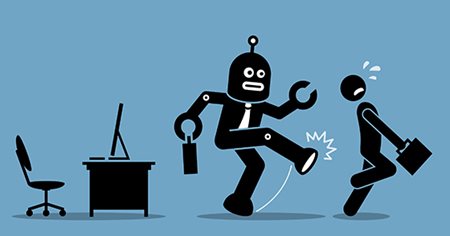Martin (2015) said something completely on-point with her post (Blog), she said, "we turn our problems over to the leader and wait for him/her to figure it out". How so incredibly true! Just look at the current state of our Nation and you will see this being played out day after day. Something happens, and everyone expects our leaders to fix everything. Personal responsibility, and taking care of our own isn't a concept that's in play these days. I'm not entirely sure when this started becoming the norm... But enough about the past, how do we change this for the future?
Kelly (2016) and many others, are sure that AI and technology will be the way of the future, and leaders will need to adapt and adjust in order to remain relevant and in charge, lest the AI bots take over and kill all of humanity to save it from themselves.
Yes, the digital world is ever evolving, and yes, many more inanimate objects are being wired to networks and are becoming 'smart', but as long as there are people in this world, face-to-face (even virtual) communication must exist; humans are just wired that way. https://www.psychcaremd.com/hardwired-for-connection/
The focus of leadership needs to continue to be communication and interpersonal relationships with people. Some of the best leaders were great communicators. https://www.forbes.com/sites/mikemyatt/2012/04/04/10-communication-secrets-of-great-leaders/?sh=77ce7e2c22fe
Even though it seems like everything has gone digital because of the pandemic, just look at the children that are so excited to get back to school in-person, and the adults that are traveling because they've had very little interaction over the past 20 months... humans need interaction and communication. Digital sources also need people to run them, program them and fix them. If the power goes out and we all of a sudden return to a time before electricity, would the human race be able to survive? A quick Google search will tell you that the odds are against it for sure.
Imagine what would happen if an entity was able to take electricity away from another...Say Country X could take electricity away from the U.S. for good, what would happen? What would our leaders do in this scenario? Would they save as many as possible? Save themselves? How would we know? No TV, radio, phones, Internet... the country would descend into chaos.
This.... this is one of the things that my agency protects against. This.... is the reason many get up and come to work everyday, to make sure that This... never happens.
While the world is focused on the digital age, and how to become more so in the future, some of us are even now trying to make sure it's a safe and secure environment when that day inevitably comes.
It's very hard to explain to someone whose entire life is digitally influenced what it's like to work all day without your cellphone, most Internet access, and the only link to the outside world is the telephone that's been sitting on the that desk for 50 years (probably not the SAME telephone). Even email is only internal. It's no wonder that many couples found each other within the agency walls :-)
The point of this entire post is that it's fine to address leadership in a digital environment, but don't forget about the 52% of the people in the world that don't own a smartphone, or the 50% that don't have access to the Internet (https://www.bankmycell.com/blog/how-many-phones-are-in-the-world). Even though many reading this may not be able to accept or understand that data, the fact is that the less than half the people in the world are living in a digital world, don't forget about them when you are deciding how to lead people into the future.

















































